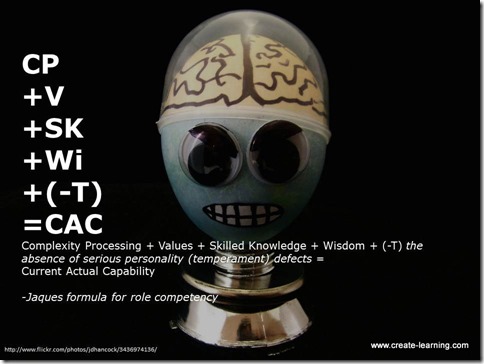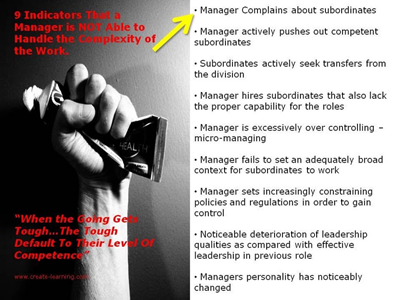As a management team distinguishing between being strong, firm managers and a marginal authoritarian tyrant is a necessary requirement. Often we misattribute yelling and being a go-getter as desirable behaviors for management. This leads to bullying behavior and a negative impact on the organization’s productivity and peoples’ desire to do great work and stay with the company.
CIP + V + SK + Wi + (-T) = CAC … Complexity Information Processing + Values + Skilled Knowledge + Wisdom + (-T) the absence of serious personality (temperament) defects = Current Actual Capability.
Competency in work is more than just intelligence. It is a combination of cognition, values, knowledge & skills, people skills, and behaviors. How do you figure out all those things?
Below is a case study of a manager that had a negative temperament (-T). I consulted + coached the management team that dealt with the fall out & demoted Ajay to a different position.
Ajay was promoted to a Vice President and was accountable for the output of 4 people doing mainly analysis of quality and customer satisfaction.
Before Ajay’s promotion, the 4 staff had wide boundaries of decision making and authority to complete their work. They were all respected by their manager and the team was seen as high performance.
The team of 5, the former Vice President and 4 staff, equally shared small office space. The former VP did a great job of setting the objective & contextual goals for & with them, he also gave the team opportunities to share detailed reports with his manager, their Manager-Once-Removed.
Ajay quickly put a stop to all the above. He used information as a weapon removing any context of the expected work often saying, “That information is none of your business, just do what I asked you to do.” He lessened their decision making authority to levels that were much below the staffs’ current capacity, making them feel grossly underemployed. He took the larger of the two offices for himself taking the conference room table with him, jamming the 4 staff members into the smallest office with all the file cabinets and printers.
Ajay frequently condemned and yelled at the staff in public and at meetings, verbally abusing them for small interpretations that varied from the strictest reading of policies & procedures. He was an authoritarian tyrant who blamed staff for what went wrong while taking credit for what went right.
He was never spoken to or told that his behavior was unacceptable by his immediate manager. All of Ajay’s immediate staff transferred out of his division as soon as they could. He was left with less competent staff that were seen as apathetic “yes men”.
Ajay is a case of minus T (-T) – evidence of extreme temperament.
He was allowed to get away with his extreme behavior in a company that has difficulty distinguishing between being strong, firm managers, and a marginal authoritarian tyrant. He most likely could have lessened his behavior by an effective managerial-leader who knew and acknowledged that this behavior is impacting the company. I found out later that his manager was “counting down his day to retirement” and did not want to have any major issues to deal with.
Ajay’s capability was demonstrated by his ability to carry out work at a much higher level of complexity from his previous position and work as an individual contributor, but his (–T) behaviors prevented him from flourishing into higher managerial roles within the company.
What do you think?
Have you experienced a manager with –T? What can be done to eliminate or ameliorate this from happening?



